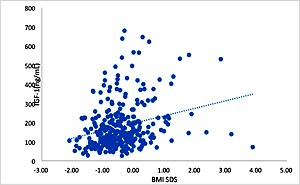Current issue
Archive
Manuscripts accepted
About the Journal
Editorial office
Editorial board
Section Editors
Abstracting and indexing
Subscription
Contact
Ethical standards and procedures
Most read articles
Instructions for authors
Article Processing Charge (APC)
Regulations of paying article processing charge (APC)
PEDIATRICS / CLINICAL RESEARCH
The correlation between serum insulin-like growth factor 1 level and body weight in children with a height less than the 10th percentile
1
Zhuzhou Central Hospital, China
Submission date: 2019-12-11
Final revision date: 2020-09-21
Acceptance date: 2020-10-08
Online publication date: 2021-05-09
KEYWORDS
TOPICS
ABSTRACT
Introduction:
This study aimed to analyze the correlation between serum insulin-like growth factor 1 (IGF-1) and body weight and provide some bases for the clinical assessment of the factors influencing children’s height.
Material and methods:
A total of 333 children with a height of less than the 10th percentile were enrolled in this study. Among these children, 212 were male and 121 were female. The age range of these children was 5–14 years. Serum IGF-1 level was detected and the Z-scores (SDS) of the children’s height, weight, and body mass index (BMI) were measured. The correlation among the factors was analyzed using Pearson’s correlation analysis.
Results:
Age, body weight, body weight SDS, BMI and BMI SDS were all correlated with serum IGF-1 level (p < 0.0001). There was also a strong correlation between body weight and serum IGF-1 level (r = 0.718) and a weak correlation between serum IGF-1 level and body weight SDS (r = 0.359). BMI SDS was weakly correlated with serum IGF-1 (r = 0.258). The correlation coefficients of age and BMI with serum IGF-1 were 0.622 and 0.536, respectively.
Conclusions:
The correlation between body weight and serum IGF-1 level is not high and it can provide some basis for the clinical assessment of the factors influencing children’s height. However, it is not the main factor affecting height.
This study aimed to analyze the correlation between serum insulin-like growth factor 1 (IGF-1) and body weight and provide some bases for the clinical assessment of the factors influencing children’s height.
Material and methods:
A total of 333 children with a height of less than the 10th percentile were enrolled in this study. Among these children, 212 were male and 121 were female. The age range of these children was 5–14 years. Serum IGF-1 level was detected and the Z-scores (SDS) of the children’s height, weight, and body mass index (BMI) were measured. The correlation among the factors was analyzed using Pearson’s correlation analysis.
Results:
Age, body weight, body weight SDS, BMI and BMI SDS were all correlated with serum IGF-1 level (p < 0.0001). There was also a strong correlation between body weight and serum IGF-1 level (r = 0.718) and a weak correlation between serum IGF-1 level and body weight SDS (r = 0.359). BMI SDS was weakly correlated with serum IGF-1 (r = 0.258). The correlation coefficients of age and BMI with serum IGF-1 were 0.622 and 0.536, respectively.
Conclusions:
The correlation between body weight and serum IGF-1 level is not high and it can provide some basis for the clinical assessment of the factors influencing children’s height. However, it is not the main factor affecting height.
Share
RELATED ARTICLE
We process personal data collected when visiting the website. The function of obtaining information about users and their behavior is carried out by voluntarily entered information in forms and saving cookies in end devices. Data, including cookies, are used to provide services, improve the user experience and to analyze the traffic in accordance with the Privacy policy. Data are also collected and processed by Google Analytics tool (more).
You can change cookies settings in your browser. Restricted use of cookies in the browser configuration may affect some functionalities of the website.
You can change cookies settings in your browser. Restricted use of cookies in the browser configuration may affect some functionalities of the website.



